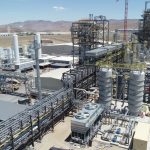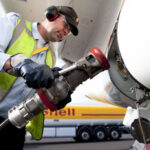Europe’s International Airlines Group (IAG), the parent of British Airways, Iberia, Aer Lingus, Vueling and LEVEL, has announced a strategic investment in Wastefront, a Norwegian recycling company that is planning a UK facility to transform scrapped tyres into sustainable aviation fuel and other renewable products. Waste tyres are increasingly being recycled into products including tyre-derived oil (TDO), which can be reprocessed into SAF or other renewable fuels for use in surface transport modes or industry. Construction of the first phase of the plant, located in the north-east England port city of Sunderland, is due for completion in 2026, enabling conversion of up to 10 million waste tyres per year when fully operational from 2027. IAG support for the Wastefront project will further diversify its SAF procurement strategy, as competition intensifies globally for alternative fuels.
Around 50 million worn or damaged tyres removed from commercial and private vehicles are scrapped each year in the UK, with most exported for disposal in landfill or incineration in cement production, one of the world’s worst industries for carbon emissions.
“Our mission is to turn a problematic waste stream into a highly valuable resource,” said Wastefront CEO Vianney Valès, commenting on the deal with IAG. “We can create SAF at an extremely competitive cost with a very low environmental footprint, capable of reducing carbon emissions in the production process by up to 80% compared to traditional jet fuels.”
Scrapped tyres are converted through the pyrolysis process, in which biomass materials are heated at extreme temperatures, but without oxygen, preventing combustion and converting the waste to properties including combustible gases and pyrolysis oil, which can then be used to make renewable fuels.
Precedence Research values the global tyre recycling market at $5.8 billion in 2024, projecting growth to $7.7 billion by 2033, a compound annual growth rate (CAGR) of 3.16%. The market research company also estimates that until 2033, there could be a yearly CAGR of 4.8% in recycling tyres through the pyrolysis process, reflecting both the continuing strong demand for renewable products and increasing global pressure to reduce emissions and landfill waste.
In addition to the new support from IAG, Wastefront is already well-backed by European energy and commodities group Vitol, Norway’s national development bank, Innovation Norway, and the Research Council of Norway, Skattefunn.
It has also secured offtake agreements with multiple major energy and raw materials corporations for recycled tyre products from the new Sunderland facility, supported by a 10-year agreement with Gateway Resources, the UK’s largest exporter of scrapped tyres, to provide feedstock for the new Sunderland recycling plant.
Initially, Wastefront will partner with third-party refineries to co-process TDO into SAF, before transferring its operations to dedicated production facilities.
The Sunderland plant, in which Wastefront has invested £100 million ($124 million), will be built in four stages, the first producing 8,000 tonnes of TDO per year, and growing to 32,000 tonnes when fully operational. By 2030, the company plans to quadruple that production, using four facilities to deliver 128,000 tonnes of TDO per year, all of which will then go to a centralised facility to produce around 90,000 tonnes of SAF per year.
The IAG-Wastefront deal comes just weeks after the UK activated a national SAF blending mandate of 2% for all jet fuel, progressively increasing to 10% in 2030, then to 22% in 2040.
“We’re proud to support innovators like Wastefront, who are finding new forms of feedstocks to produce advanced fuels,” said Jonathon Counsell, IAG’s Group Sustainability Officer.
“As global demand for SAF grows, it’s crucial to expand production in the UK. The recent government mandate will help reduce aviation‘s overall carbon impact, but airlines need confidence that the planned revenue certainty mechanism will support UK businesses in developing SAF technology without further increasing the cost base for UK airlines.”
IAG operates 582 aircraft across its five airlines and directly connects Europe to over 250 destinations in 91 countries. The group has committed that 10% of the jet fuel it uses in 2030 will be SAF and has already secured one third of the product it needs to reach that target. By 2050, the company expects that SAF will comprise 70% of its total jet fuel consumption.
Graphic: Render of the Wastefront facility in the Port of Sunderland, UK














More News & Features
SAF One announces new investment and technology partners for Middle East SAF project
New initiative formed to accelerate SAF adoption and production in the Pacific Northwest
EcoCeres opens new Malaysia production facility as SAF ambition in Asia scales up
Aviation, shipping and fuel leaders convene in Rotterdam to accelerate sustainable fuels scale-up
EU SAF mandates will have to be revised, predicts French oil chief
Lessons learned from the collapse of Fulcrum BioEnergy